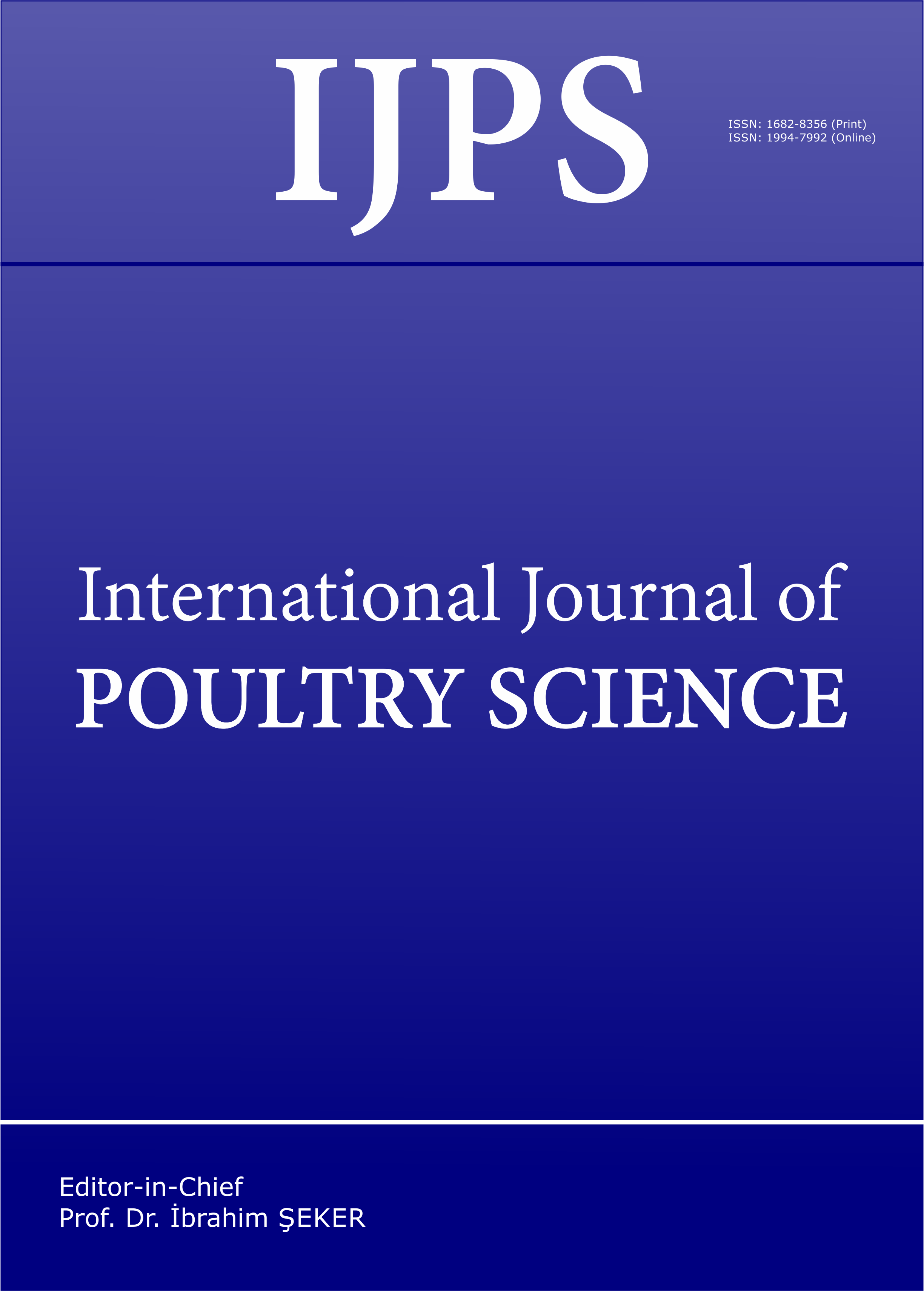Cost-Effective Media for Production of Lactic Acid Bacteria Isolated from Poultry in Kuwait
DOI:
https://doi.org/10.3923/ijps.2019.598.603Keywords:
Bacterial growth media, molasses, poultry production, probiotics, tomato serum, yeast extractAbstract
Background and Objective: Poultry is a primary source of meat in Kuwait. Abuse of antibiotics in the poultry industry can lead to unfavorable effects on food safety. However safer approaches, such as probiotic use, can be expensive. The present study screened cost-effective media formulations which support growth of lactic acid bacteria. Materials and Methods: Shake flask experiments were conducted using three bacterial strains isolated from Kuwaiti poultry farms (Lactobacillus brevis, Lactobacillus parabuchneri and Pediococcus pentosaceus). Ten media formulations containing different concentrations of tomato serum, molasses and yeast extract were inoculated with bacteria and incubated at 30, 35, or 37°C. Samples were taken periodically (0, 24 and 48 h), plated on selective agar and incubated overnight; growth was measured the next day. Statistical analysis revealed the formulation that supports the highest growth when compared to de Man Rogosa and Sharpe medium. Results: The formulation containing 5 g L–1 yeast extract, 200 mL L–1 tomato serum and 10 g L–1 molasses resulted in the best overall growth and supported a longer exponential phase compared to the commercial medium. Conclusion: This new media could be used as a cost-effective alternative for large-scale production of certain poultry probiotics.
References
FAO., 2014. FAO Statistatical Year Book 2014. Food and Agriculture Organization, Rome, Italy.
Goncalves-Tenorio, A., B.N. Silva, V. Rodrigues, V. Cadavez and U. Gonzales-Barron, 2018. Prevalence of pathogens in poultry meat: A meta-analysis of European published surveys. Foods, Vol. 7, No. 5.
Stromberg, Z.R., J.R. Johnson, J.M. Fairbrother, J. Kilbourne, A. van Goor 3rd, R. Curtiss and M. Mellata, 2017. Evaluation of Escherichia coli isolates from healthy chickens to determine their potential risk to poultry and human health PLoS One, Vol. 12, No. 7.
Peralta-Sánchez, J.M., A.M. Martín-Platero, J.J. Ariza-Romero, M. Rabelo-Ruiz and M.J. Zurita-González et al., 2019. Egg production in poultry farming is improved by probiotic bacteria Front. Microbiol., Vol. 10.
Phan, T.T., L.T. Khai, N. Ogasawara, N.T. Tam, A.T. Okatani, M. Akiba and H. Hayashidani, 2005. Contamination of Salmonella in retail meats and shrimps in the Mekong Delta, Vietnam. J. Food Protect., 65: 1077-1080.
Hill, C., F. Guarner, G. Reid, G.R. Gibson and D.J. Merenstein et al., 2014. The International Scientific Association for Probiotics and Prebiotics consensus statement on the scope and appropriate use of the term probiotic. Nat. Rev. Gastroenterol. Hepatol., 11: 506-514.
Gibson, G.R. and M.B. Roberfroid, 1995. Dietary modulation of the human colonic microbiota: Introducing the concept of prebiotics. J. Nutr., 125: 1401-1412.
Vlasova, A.N., S. Kandasamy, K.S. Chattha, G. Rajashekara and L.J. Saif, 2016. Comparison of probiotic lactobacilli and bifidobacteria effects, immune responses and rotavirus vaccines and infection in different host species. Vet. Immunol. Immunopathol., 172: 72-84.
Research and Markets, 2019. Probiotics in animal feed market by livestock (Poultry, ruminants, swine, aquaculture, pets), source (Bacteria [Lactobacilli, Streptococcus Thermophilus, Bifidobacteria] and Yeast & Fungi), form (Dry and liquid) and region-Global forecast to 2025. https://www.researchandmarkets.com/reports/4763770/probiotics-in-animal-feed-market-by-livestock.
Balba, M., A. Yateem, S. Al-Zenki, T. Al-Surrayai, R. Al-Daher and Y. Al-Shayji, 2012. Isolation, characterization and evaluation of lactic acid bacteria for the development of poultry probiotics. Kuwait Institute for Scientific Research, Report No. KISR 11219.
Sanders, E.R., 2012. Aseptic laboratory techniques: Plating methods. J. Vis. Exp., Vol. 63.
De Man, J.C., M. Rogosa and M.E. Sharpe, 1960. A medium for the cultivation of Lactobacilli. J. Applied Bacteriol., 23: 130-135.
Juturu, V. and J.C. Wu, 2016. Microbial production of lactic acid: the latest development. Crit. Rev. Biotechnol., 36: 967-977.
Fugelsang, K.C. and C.G. Edwards, 2006. Wine Microbiology: Practical Applications and Procedures. 2nd Edn., Springer Berlin, Germany, Pages: 394.
Eto, M. and A. Nakagawa, 1975. Identification of a growth factor in tomato juice for a newly isolated strain of Pediococcus cerevisiae. J. Inst. Brew., 81: 232-236.
Quan, Z.X., Y.S. Jin, C.R. Yin, J.J. Lee and S.T. Lee, 2005. Hydrolyzed molasses as an external carbon source in biological nitrogen removal. Bioresour. Technol., 96: 1690-1695.
Tamizharasi, V., J. Srinkanth and G. Santhalakshmi, 2005. Molasses-based medium requires no nitrogen supplement for culturing three entomopathogenic fungi. J. Biol. Control, 19: 135-140.
Numbeo, 2019. Cost of living. https://www.numbeo.com/cost-of-living/.
Abdal, M., M. Suleiman, N.R. Bhat and S. Jacob, 2009. Cost of cultivation of tomato in Kuwait in uncooled plastic tunnel system-A case study. World Applied Sci. J., 6: 1625-1628.
Informa UK Limited, 2019. World molasses & feed ingredients report. https://www.agra-net.com/agra/world-molasses-and-feed-ingredients-report/.
Downloads
Published
Issue
Section
License
Copyright (c) 2019 The Author(s)

This work is licensed under a Creative Commons Attribution 4.0 International License.
This is an open access article distributed under the terms of the Creative Commons Attribution License, which permits unrestricted use, distribution and reproduction in any medium, provided the original author and source are credited.

